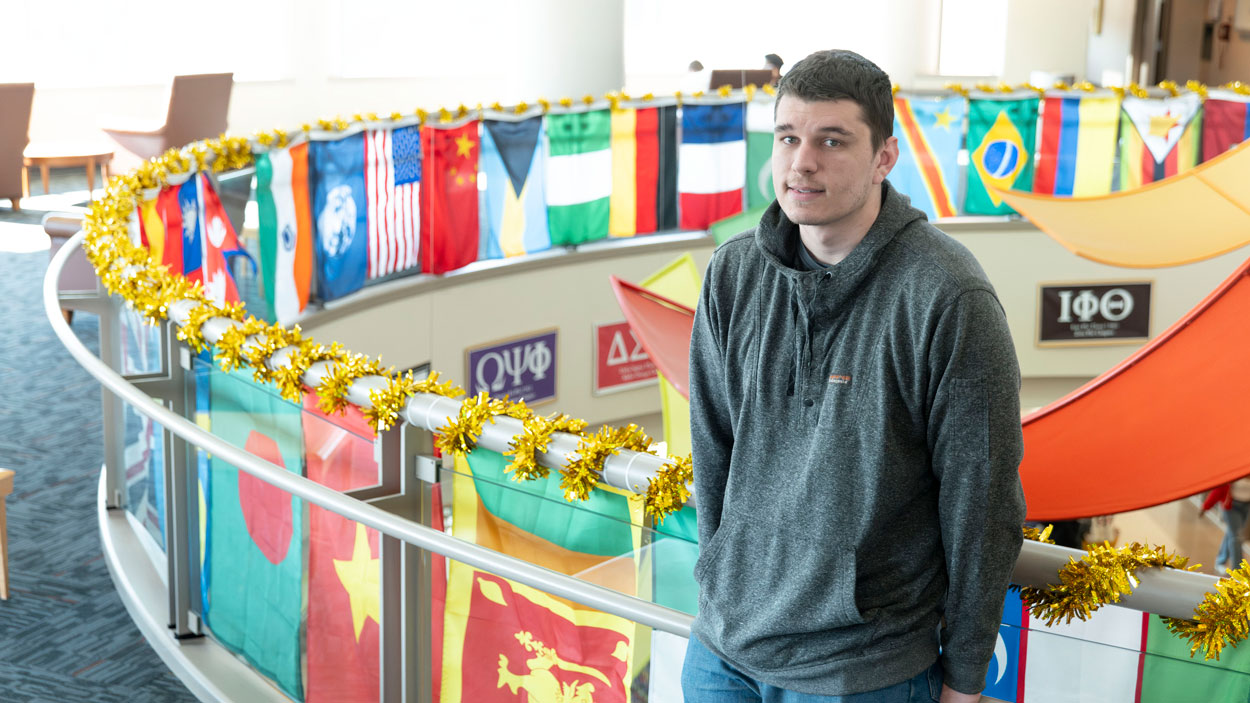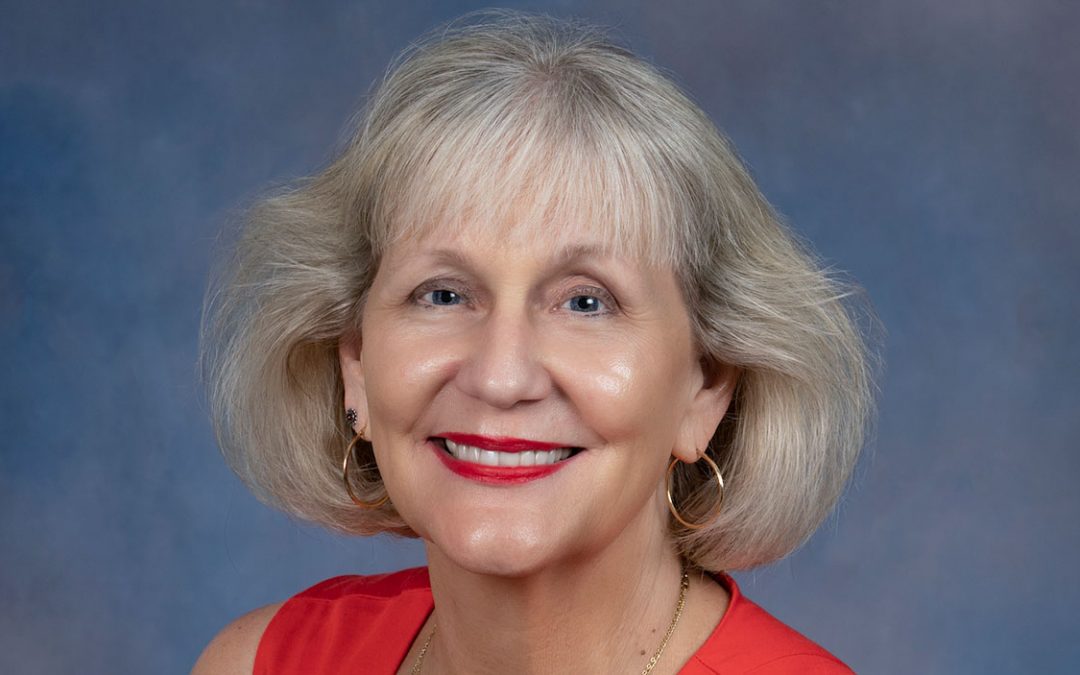
Jon Velier graduated from the Office of Inclusive Postsecondary Education’s Succeed Program, earning a Chancellor’s Certificate, and is now excelling in the Department of Language and Culture Studies’ Japanese program. Last year, he entered an English subtitling contest sponsored by Japan Visualmedia Translation Academy and won second place. (Photo by Derik Holtmann)
Jon Velier traces his interest in the Japanese language to middle school.
That’s when he began watching Japanese anime shows such as “Bleach,” “Naruto” and “One Piece.” At the time, in the early 2000s, he was part of a growing fanbase in the United States eager to watch anything coming from Japan. Unfortunately, dedicated American fans were often stuck waiting for new episodes.
Though in Velier’s case, there was a silver lining.
“Companies had to get the licenses, then they had to record an English dub,” he explained. “That took a while, so there was just a whole community of people who would subtitle anime as it aired in Japan, basically same day, and release it on the internet. That’s when I started to get an interest in the language itself.”
It led Velier to study Japanese in high school and community college and eventually took him from California to the University of Missouri–St. Louis. Velier has graduated from the Office of Inclusive Postsecondary Education’s Succeed Program, earning a Chancellor’s Certificate, and matriculated into the Department of Language and Culture Studies’ Japanese program.
He aims to take part in the program’s Japan Study Tour – a two-week summer session during which students visit businesses and cultural sites in Nagano, Nikko and Tokyo with faculty members – as he continues to work toward his bachelor’s degree in Japanese and a future career in translation.
Velier’s hometown of San Diego was an ideal environment to nurture his burgeoning interest. The city’s diverse Kearny Mesa Neighborhood has been the heart of a thriving Japanese community for decades and is still home to many Japanese businesses. Velier’s high school also offered Japanese as an option for students’ foreign language requirement.
Despite a deepening interest in anime, Velier opted to take American Sign Language his freshman year. However, he realized that signing’s focus on facial expressions and body language weren’t a fit with his personal communication style.
“After I finished the class, I realized that I was sort of exhausted from it,” he said. “I wasn’t really enjoying the process of learning. It didn’t really mesh well with me, I think.”
The next year, he decided to try learning Japanese but admits that he didn’t go into the class with the best attitude. One day, his teacher pulled him aside and said that he needed to take the class seriously.
“That kind of shocked me a bit, I guess,” Velier said. “After that, it became an enjoyable experience to learn.”
The talk spurred a complete turnaround.
“It was just the strangest feeling,” Velier said. “I would look forward to the final in my Japanese class. Like, ‘Wow, I can test my knowledge. I can see how far I’ve come.’”
After graduating high school, Velier continued to study Japanese in community college. But his family encouraged him to look into four-year institutions. After researching options, the family found UMSL.
Not only does the university offer a bachelor’s degree in Japanese, but the Office of Inclusive Postsecondary Education offers programs in the College of Education, like Succeed, designed to teach academic, job and life skills to students with intellectual and developmental disabilities while they work toward a two-year certificate.
The Succeed Program helped Velier acclimate to life on a college campus, and after earning his certificate, he matriculated into the modern languages bachelor’s program. In doing so, he was among the first Succeed students to complete the program and pursue an undergraduate degree.
The transition has been smooth – something Velier attributes to dedicated and understanding faculty members such as Associate Teaching Professor Keiko Ueda and Assistant Teaching Professor Hiroko Yoshii.
“I really, really appreciate the Japanese program here – Ueda-sensei and Yoshii-sensei in particular,” he said. “My favorite part about it is it feels like an environment where it’s OK to make mistakes. The thing is, with languages, it’s a slow burn process. You have to be OK with making mistakes and a little bit of failure at some point because you’re starting from scratch.”
While there’s room for mistakes, Velier has seen plenty of success. Last year, he entered an English subtitling contest sponsored by Japan Visualmedia Translation Academy, a leading organization in the translation industry, and won second place.
“It was an interesting experience,” he said. “When you have to subtitle things in an official capacity, there are character limits. You can only express a line within a certain amount of letters. If it’s longer than that, you can break it up, but because the movie keeps rolling, you have to figure out a balance between how do I express the character but make sure the audience understands what they’re reading.”
Namiko Nagayama, an instructor and translation project coordinator with JVTA, commended the winner and Velier in a press release.
“For this contest, we looked for submissions that had good word choice, balanced line breaks, and subtitles that adhered to the character limit while communicating the necessary nuance in a way that was easy to understand,” she said. “We also looked for submissions that included dialogue that sounded natural and captured the tone and personality of the characters while not being overly casual.”
This summer, Velier looks forward to studying abroad via the Japan Study Tour. He hopes to be able to visit Akihabara, a neighborhood in Tokyo famous for its anime, electronic and video game shops.
After graduation next spring, he would like to work in translation – and maybe spend a little more time in Japan.
“I guess the thing I’m thinking about most is working as a translator for video game companies,” he said. “They want in-house translations. They want people to work at their company, so they can work with the staff members closely. If I get that kind of job, then that means I could have a reason to stay in Japan for a little longer.”














